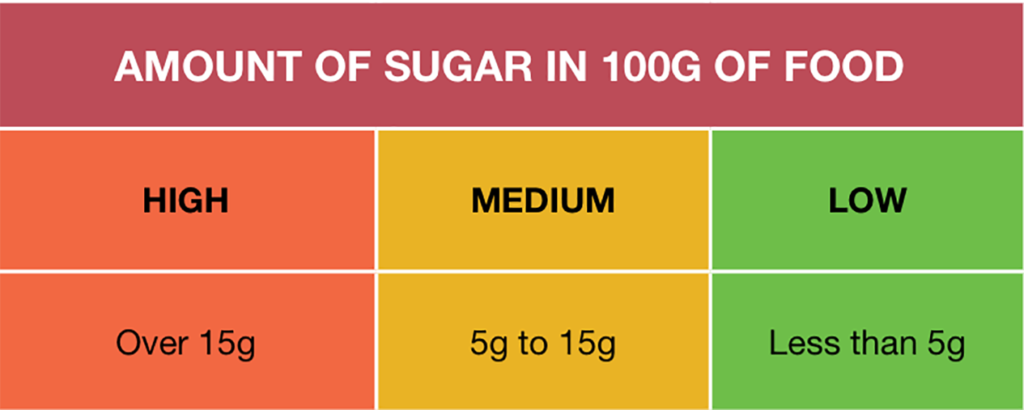Limit Consumption of Sugar Sweetened Drinks
There is convincing evidence that consumption of sugar-sweetened drinks is a cause of weight gain and obesity in both children and adults, especially when consumed frequently and in large portions. Sugar-sweetened drinks do this by promoting excess energy (calorie) intake relative to the energy we expend. There is strong scientific evidence that greater body fatness is a cause of 12 different cancers.
WHAT IS CONSIDERED A ‘SUGARY DRINK’?
Sugary drinks refer to drinks with added sugar. They include soda, minerals, sports and energy drinks, barley water, cordial and coffee and tea-based beverages that have sugars or syrups added to them. They do not include versions of these drinks which are labelled as ‘sugar free’ or those with artificial sweeteners added. As a lot of sugar is ‘hidden’ within foods we buy, it is easy to underestimate the amount of sugar we are taking in over the day. For an adult with a healthy body weight it is recommended that no more than 30 grams of added or free sugars should be eaten per day. One teaspoon is approximately 4 grams of sugar, so the recommendation is no more than 6 teaspoons per day. To put this into context, current figures suggest adults are consuming 59 grams of sugar per day. Most of the sugar we eat comes from food and drink such as soft drinks, cakes, biscuits, sugar, jam, milk products and alcohol. Sugar sweetened drinks take up a quarter of our daily sugar intake.
In recent years, consumption of sugar sweetened drinks has increased dramatically, particularly in low and middle-income countries. While the sale of these drinks has decreased in high-income countries, average daily intakes have remained high. Sugar sweetened drinks are often consumed with other high calorie foods. This can lead to greater body fatness.
HOW DOES CONSUMPTION OF SWEETENED DRINKS AFFECT CANCER RISK?
Drinking sugary drinks regularly results in overconsumption of calories and leads to weight gain. This excess weight has been associated with an increased risk of 12 different cancers including: mouth, pharynx and larynx, oesophagus (Adenocarcinoma), stomach (cardia), pancreas, gallbladder, liver, colon and rectum, breast (postmenopausal), ovary, endometrium, prostate (advanced) and kidney.
WHAT CAN I DO TO REDUCE MY SUGAR SWEETENED DRINK INTAKE?
Many of the cancer prevention recommendations made by the WCRF tie in together and this recommendation is no different. By increasing the amount of plant foods being eaten (recommendation 4) and reducing the amount of animal foods (recommendation 5) and energy-dense, processed foods being eating (recommendation 3) being consumed, the amount of sugar being consumed will naturally decrease. There are several other ways you can consciously reduce your daily sugar sweetened drink intake:
- Check food labels: When trying to judge whether drinks are high in a certain nutrient or when comparing drinks, always look at the ‘per 100g of food’ column. By law, foods must display the nutritional information per 100g of the food for each of the main nutritional components, including sugar. Once you have identified how much sugar is in 100g of the drink, you can use the cut-offs shown in the table below to decide whether the food is high, medium or low in sugar. Use this to choose drinks that are mostly low in sugar and to avoid drinks high in sugar.

- Choose ‘no-added sugar’ or ‘low sugar’ varieties: As sugar has been well-documented as an unhealthy additive to food, many manufacturers have taken note and released ‘no-added sugar’ or ‘low-sugar’ varieties of their products. For example, fizzy drinks are usually extremely high in sugar, however many large brands have released low-sugar drinks to give consumers more control over their sugar content.
- To maintain adequate hydration, it is best to drink water or unsweetened drinks such as tea or coffee with no added sugar. Fruit juices are recommended to be consumed in small amounts, as even unsweetened juices can cause weight gain in a similar way to sugar-sweetened drinks. Scientific research has found that artificially sweetened drinks do not play a strong role in overweight/obesity or cancer occurrence.









 Contact
Contact